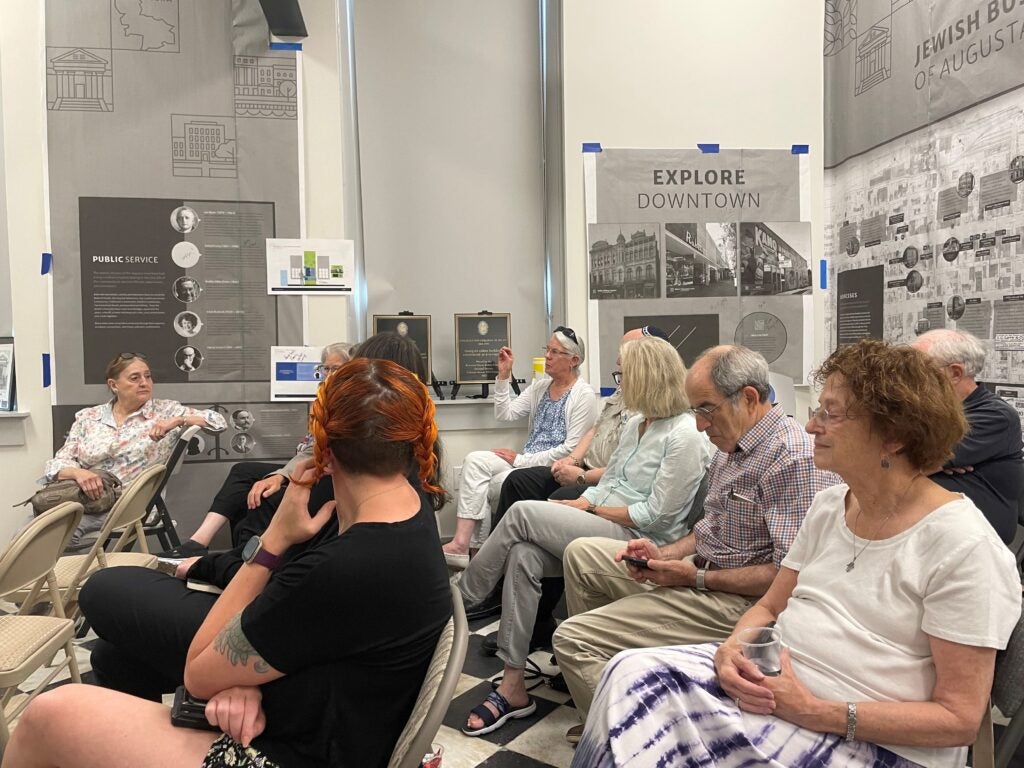The Augusta Jewish Museum (AJM) hosted a free, public discussion on the 1961 film “Judgment at Nuremberg” Sunday afternoon.
Judith Giri, the AJM’s programming chair, organized the gathering to supplement “World War II: The War That Changed the World,” the traveling exhibit by Kennesaw State University currently installed at the museum.
“As the number of people who experienced the war and its impact directly, and those who survived the atrocities that were committed during the war, is getting smaller, many museums like the museum at KSU and our small Jewish Museum in Augusta want to make sure the lessons of history are not lost to future generations,” said Giri.

The roughly three-hour courtroom drama is a fictionalized depiction of a trial held by the U.S. military in Nuremberg of four German legal officials for crimes against humanity committed under the Nazi regime.
The AJM invited attendees to watch the film beforehand for free, via a link to the film on the Pluto streaming service, but welcomed anyone interested to come and participate whether they had seen the film or not.
“The movie is kind of a jumping off point,” said Augusta attorney Rachel Ray, who moderated the discussion. “What we’ve learned from our history and how we can kind of apply it into what’s happening in our society today.”
Ray began the panel by giving a summary of the film, and then presenting two clips, one of them in which the character of Ernst Janning, played by Burt Lancaster, gives a speech confessing his part in the Nazi atrocities, uttering the line, “Why did we sit silent? Why did we take part? Because we loved our country. What difference does it make if a few political extremists lose their rights? What difference does it make if a few racial minorities lose their rights? It is only a passing phase. It is only a stage we are going through. It will be discarded sooner or later. Hitler himself will be discarded — sooner or later.”
The other scene was near the end, in which Judge Dan Haywood, portrayed by Spencer Tracy, issues his verdict against the German justices on trial.
After Ray asked the audience why the Janning character went from denying that the U.S. had any jurisdiction, to, near the end of the movie, fervently admitting his own guilt and that of his fellow defendants, a discourse ensued among the attendees addressing a host of moral, legal and political issues.
“I think one of the themes in the whole movie, and of course, this whole issue, is the constant tension between the responsibility of society and responsibility of the individual,” said attendee Steve Moore, a long-time Columbia County history teacher. “The shattering truth is, in a society with all of this culture, all of this law, these extraordinarily well educated, brilliant men, it happened all too easily… We have to realize we live in a broken world, with fallen people, and even extraordinary people with great education and patriotic hearts and a desire to do good will still do this.”
At one point, Ray raised the questions of when and how a concerned citizen should get involved — politically or otherwise — to stand up against a burgeoning injustice, as the judges and lawyers in the film, and the people of Germany during World War II.
“I think you have to continue the good fight at every level,” said Michael Cohen, who volunteers with the AJM. “Hitler was voted in democracy, and there was a short time period where one judge was able to get out of Dodge. Everybody else stayed because Germany was in bad shape, and Hitler promised them he’d make it better. So some of the people really believed all this stuff in ‘Mein Kamp.’ Most people thought, well, we’ll just ride his bandwagon, and this’ll be a passing fancy, and things will get better. Well, they were wrong.”
Giri said that both the exhibit and the film ask difficult questions, such as what happens when totalitarian regimes impose distorted views — racial and otherwise — that determine who lives and who dies. She notes that concepts like genocide and crimes against humanity were coined after WWII, but have not become obsolete.

“This is the type of thing that you need to do to keep the information out there,” said Ray. “Because if it’s not out there, it dies. That’s the only thing we can’t allow, is to let the information die.”
Giri said the AJM hopes to host other forums such as this in the future, with the next film being “Denial” from 2016, about Holocaust denial.
Skyler Q. Andrews is a staff reporter for The Augusta Press. Reach him at skyler@theaugustapress.com.










